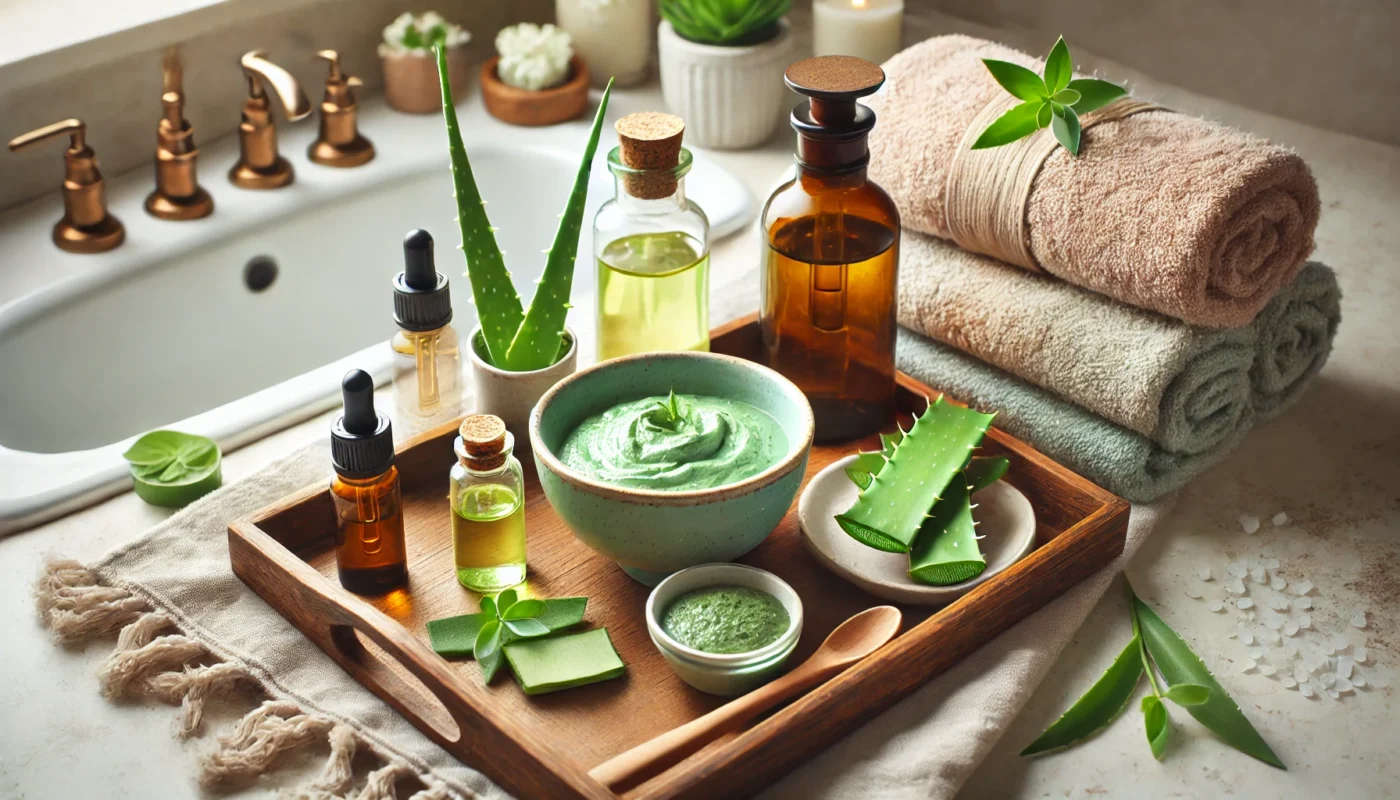Hormonal acne can be a persistent and frustrating issue. It’s not just a teenage problem, but can affect adults too.
Understanding the root cause is the first step towards finding a solution. Hormonal acne is often linked to fluctuations in hormones, particularly androgens.
But what if you’re seeking a natural approach to manage this condition? You’re not alone. Many are turning to holistic and alternative health practices for relief.
This comprehensive guide is designed to help you navigate the world of natural remedies for hormonal acne. It aims to demystify the science behind these methods, making it accessible and practical.
We’ll delve into dietary strategies, the role of gut health, and the potential benefits of certain supplements and herbs. We’ll also explore topical treatments and lifestyle changes that can help balance hormones and improve skin health.
Remember, each person’s skin is unique. What works for one may not work for another. It’s about finding what works best for you.
So, whether you’re a fitness enthusiast, a health enthusiast, or a medical patient, this guide is for you. Let’s embark on this journey towards better skin health, naturally.
You may also like: Top Supplements to Combat Hormonal Acne
Understanding Hormonal Acne
Hormonal acne is a type of acne driven by hormonal fluctuations. It often manifests as deep, cystic bumps beneath the skin. Unlike regular acne, hormonal acne tends to flare up during specific times in the hormonal cycle. This includes events like menstruation, menopause, or periods of high stress.
Women are more commonly affected than men due to more frequent hormonal shifts. Hormonal acne can appear on different parts of the body, typically affecting the face, jawline, and neck. It’s essential to differentiate it from other forms of acne.
Common triggers include hormone changes, dietary influences, and stress factors. A healthcare professional can help diagnose hormonal acne through evaluation of symptoms. Understanding these triggers is key to managing the condition effectively.
To better navigate the complexities of hormonal acne, here are a few common characteristics:
- Deep, cystic bumps that are painful
- Mostly appears along the jawline and chin
- Flare-ups coincide with hormonal changes
By recognizing these patterns, you can take a more informed approach to treatment.
What is Hormonal Acne?
Hormonal acne is acne that’s linked to fluctuations in hormones. It’s predominantly influenced by androgens, which are male hormones present in both men and women. These hormones can increase sebum production, leading to clogged pores and acne development.
This acne type is particularly common during puberty, but it can affect adults too. Women often experience it around their menstrual cycle. In contrast with other acne forms, hormonal acne tends to be more cystic, causing painful, deep-seated spots.
The Role of Hormones in Acne
Androgens play a significant role in acne development. They drive the sebaceous glands to produce more oil. This excess oil can mix with skin cells and clog pores, creating a breeding ground for acne-causing bacteria.
Fluctuations in estrogen and progesterone also influence acne. These hormones can shift dramatically during certain times, like menstruation or pregnancy, impacting oil production and skin shedding rates. Stress can also affect hormone levels, increasing cortisol and exacerbating acne.
Identifying Hormonal Acne
Identifying hormonal acne involves recognizing patterns related to hormone cycles. If acne flares consistently during menstruation or at specific points in a hormonal cycle, it’s likely hormonally driven.
Hormonal acne is often resistant to over-the-counter treatments. The typical over-the-counter acne products may not be effective. This is a cue that a hormonal imbalance may be involved. Consulting a dermatologist can provide a clear diagnosis.
Understanding the nature of your acne is crucial. It empowers you to choose an appropriate, potentially more effective treatment strategy.

Dietary Strategies for Hormonal Acne
Diet plays a pivotal role in managing hormonal acne. Nutrient-rich foods can help maintain hormonal balance and promote clear skin. Understanding which foods support or hinder skin health is key to developing an effective dietary strategy.
Specific dietary changes can help reduce inflammation and regulate hormone levels. A diet low in processed foods and high in whole foods typically benefits those suffering from hormonal acne. This approach helps stabilize blood sugar levels, reducing acne flare-ups.
Balancing macronutrients can support skin health. Including foods rich in healthy fats, proteins, and low-glycemic carbohydrates is recommended. These nutrients offer a foundation for sustained energy and hormonal harmony.
Consuming adequate fiber through fruits, vegetables, and whole grains can aid in detoxification. Effective elimination through the digestive system can prevent toxin buildup, which might otherwise manifest as acne.
Hydration is another essential dietary component. Drinking plenty of water helps maintain skin moisture and flush out toxins. Dehydrated skin can overproduce oil, leading to clogged pores and acne.
Including certain vitamins and minerals is also crucial. Nutrients like zinc, vitamin A, and omega-3 fatty acids play a role in reducing inflammation and regulating sebum production.
While dietary changes can significantly impact acne, they are just one part of a holistic approach. Incorporating other lifestyle and topical strategies further enhances results.
Foods to Include
To help manage hormonal acne naturally, include foods that support hormonal balance:
- Leafy Greens: Spinach and kale are rich in antioxidants and vitamins.
- Berries: Blueberries and strawberries are high in vitamin C and fiber.
- Fatty Fish: Salmon and mackerel provide omega-3 fatty acids.
- Nuts and Seeds: Almonds and flaxseeds offer zinc and healthy fats.
- Whole Grains: Quinoa and brown rice maintain blood sugar levels.
- Avocados: Loaded with healthy fats and vitamin E.
- Fermented Foods: Yogurt and sauerkraut support gut health.
These foods work together to reduce inflammation and balance hormones. Incorporating them regularly can aid in achieving clearer skin. They provide essential nutrients that promote overall well-being and combat acne triggers.
Foods to Avoid
Certain foods can exacerbate hormonal acne and should be minimized:
- Dairy Products: Milk and cheese can lead to increased sebum production.
- Sugary Foods: Candy and sodas can cause blood sugar spikes.
- Refined Carbs: White bread and pasta can increase androgen levels.
- Fried Foods: Contain trans fats that induce inflammation.
- Processed Snacks: Chips and cookies often have high glycemic indexes.
- Red Meat: Can lead to increased hormone activity.
- Caffeine: Excess coffee and energy drinks may elevate cortisol levels.
These foods might not directly cause acne but can contribute to hormonal imbalances. Reducing or eliminating them could result in noticeable skin improvements. Opting for whole, unprocessed foods supports a more balanced hormonal environment.
The Importance of Gut Health
Gut health significantly influences the body’s overall wellness, including skin condition. A balanced gut microbiome can regulate inflammation and hormone levels. This regulation is crucial for managing hormonal acne effectively.
When gut flora is imbalanced, it can lead to systemic inflammation. Inflammation is a known trigger for acne flare-ups. Therefore, maintaining a healthy gut can help keep acne at bay.
Gut health also affects nutrient absorption. Proper digestion ensures that skin receives essential vitamins and minerals. These nutrients are vital for skin repair and maintaining a clear complexion.
Probiotics and Skin Health
Probiotics are beneficial bacteria that support gut health. They can help restore balance within the gut microbiome. By enhancing gut flora, probiotics may reduce acne-related inflammation.
Incorporating probiotics into your diet can be straightforward. Fermented foods like yogurt, kimchi, and kefir are rich in these beneficial bacteria. These additions help promote a healthy digestive system and clear skin.
Moreover, probiotic supplements offer another way to enhance gut flora. These supplements can be a practical choice for those unable to consume fermented foods. Integrating probiotics into your daily routine can positively impact skin health over time.
Natural Supplements and Herbs
Natural supplements and herbs can offer promising support for those seeking to cure hormonal acne naturally. These remedies often provide nutrients that might be lacking in your diet. They can also offer additional benefits like reducing inflammation or balancing hormones.
Choosing the right supplements requires understanding their specific benefits. It’s important to consider your individual health needs. Some supplements can help regulate sebum production, while others might boost immune function.
Consult a healthcare professional before beginning any new supplement regimen. This ensures safe and effective integration into your routine. Professional guidance is particularly crucial if you’re taking other medications.
Natural remedies include both vitamins and a variety of herbs. Some have been used for centuries in traditional medicine. These treatments often have fewer side effects compared to synthetic options.
Here’s a list of notable vitamins and herbs for managing hormonal acne:
- Zinc
- Vitamin A
- Omega-3 fatty acids
- Spearmint tea
- Saw palmetto
Always aim for quality when selecting supplements. Research brands and read reviews to ensure product authenticity. High-quality supplements are more likely to provide the desired benefits.
Vitamins and Minerals
Vitamins and minerals play a vital role in maintaining skin health. Zinc, for example, is a powerful mineral known for its anti-inflammatory properties. It can help reduce redness and swelling associated with acne.
Vitamin A contributes to skin cell turnover. It prevents pores from becoming clogged with dead skin, a common cause of acne. Foods like sweet potatoes and carrots are rich in this nutrient.
Omega-3 fatty acids are not classified as vitamins or minerals, but they deserve mention here. These healthy fats, found in fish oil, can reduce systemic inflammation. This, in turn, may help decrease the severity of acne flare-ups.
Herbal Remedies
Herbal remedies present another avenue for tackling hormonal acne. Spearmint tea is a popular choice, known to reduce androgen levels in women. Lowering these male hormones can help control acne.
Saw palmetto is another herb associated with balancing hormones. It may block the activity of certain androgens linked to acne development. It’s often used as a supplement in capsule form.
Turmeric is renowned for its anti-inflammatory effects. It can be used both topically and internally to manage acne symptoms. Adding turmeric to your diet or applying it as a mask can benefit the skin significantly.
Embracing natural supplements and herbs requires patience and consistency. Results may take time, but they can be a rewarding path to healthier skin.

Topical Treatments and Skincare
Topical treatments are essential in managing hormonal acne naturally. A key component is using products that address both bacteria and inflammation. They can be very effective when paired with a balanced skincare routine.
Choosing the right ingredients for topical use can impact your skin’s health significantly. Essential oils and anti-inflammatory agents are popular natural treatments. They target inflammation while helping reduce acne-causing bacteria on the skin.
Understanding product labels is crucial. Opt for non-comedogenic items that won’t clog your pores. This practice helps prevent the worsening of acne and reduces the risk of new breakouts.
Here is a list of beneficial topical ingredients for acne-prone skin:
- Tea tree oil
- Aloe vera
- Witch hazel
- Green tea extract
- Jojoba oil
Always perform a patch test before applying new products. This step ensures that your skin doesn’t have an adverse reaction. Everyone’s skin is different, so proceed with care and patience.
Consistency is key in skincare routines. Natural remedies may take time to show results, but dedication often leads to a smoother complexion. Build your routine around your specific needs and monitor your skin’s response.
Essential Oils and Acne
Essential oils can be a natural ally in the fight against hormonal acne. Tea tree oil, renowned for its antibacterial properties, is particularly effective. It targets acne-causing bacteria and soothes inflammation.
Incorporate essential oils into your routine carefully. Dilute them with a carrier oil to prevent skin irritation. For many, jojoba or almond oil works well as a base.
Natural Anti-Inflammatory Agents
Anti-inflammatory agents like aloe vera and witch hazel are valuable in reducing acne symptoms. Aloe vera calms irritated skin and promotes healing. Its soothing properties make it ideal for sensitive skin.
Witch hazel is an astringent that can help tighten pores. It reduces inflammation and controls oil production. Both ingredients offer natural relief without the harshness of chemical treatments.
Non-Comedogenic Skincare Routine
A non-comedogenic skincare routine is vital for managing acne. Look for products labeled as non-comedogenic; they won’t block your pores. This minimizes the chance of new breakouts.
Focus on gentle cleansing and light moisturizing. Avoid harsh exfoliants that can irritate and inflame acne-prone skin. Your goal should be to support your skin’s barrier without over-stripping natural oils.
Lifestyle Changes for Hormonal Balance
Lifestyle modifications can play a pivotal role in managing hormonal acne. These changes aim to stabilize hormones naturally, thereby alleviating acne symptoms. Understanding your body’s needs and making small, positive adjustments can lead to significant improvements over time.
Nutrition, exercise, stress management, and sleep all influence hormonal balance. Each aspect contributes uniquely to overall skin health and can impact acne severity. Consider implementing several lifestyle changes to see what works best for you.
Here are some lifestyle changes to consider for hormonal balance:
- Incorporate regular exercise into your routine
- Practice daily stress management techniques
- Prioritize sufficient and quality sleep
- Maintain a balanced, nutrient-rich diet
- Reduce exposure to environmental toxins
Every individual’s body responds differently, so it’s important to track your progress. Evaluate how these changes affect your skin and adjust your approach as necessary. This personalized method ensures you’re addressing your unique triggers.
Transitioning to a balanced lifestyle might take time, but the rewards are often worthwhile. By fostering a holistic approach, not only will your skin benefit, but so will your overall well-being. Remember, consistency and patience are key to achieving and maintaining clear skin.
Exercise and Hormonal Acne
Regular exercise is beneficial for hormonal balance, which can, in turn, influence acne. Physical activity helps reduce stress hormones, like cortisol, that can exacerbate acne. It also promotes blood circulation, which nourishes skin cells and helps remove waste products.
Engaging in moderate exercise, such as yoga, walking, or cycling, can be effective. These activities help regulate hormones and reduce acne flare-ups. Be sure to cleanse your skin post-workout to remove sweat and prevent pore clogging.
Stress Management Techniques
Stress can significantly impact hormone levels, influencing acne severity. Employing stress management techniques can help maintain balanced hormones. Practices such as meditation, mindfulness, and deep breathing are effective in reducing stress.
Incorporating these techniques into your daily routine supports overall mental health. As stress decreases, hormonal fluctuations stabilize, which may lead to clearer skin. Remember, consistency is crucial for realizing the full benefits of stress reduction.
The Role of Sleep and Environmental Factors
Adequate sleep is essential for hormonal regulation and healthy skin. Aim for 7-9 hours of quality sleep each night. Environmental factors, such as pollution and toxins, can also aggravate acne. Limit exposure and use gentle skincare products to protect your skin.
When to See a Professional
While natural remedies can be effective, some cases of hormonal acne require professional intervention. It’s essential to seek advice if your acne persists despite trying various lifestyle changes and home treatments. Persistent acne can indicate underlying hormonal imbalances needing medical evaluation.
Consulting with a dermatologist or healthcare provider can provide additional insights. They can recommend a personalized treatment plan, ensuring it aligns with your health goals. This might include specific medical therapies or advanced skincare techniques for comprehensive care. Early intervention with professional guidance can prevent scarring and support long-term skin health.

Conclusion: Embracing a Holistic Approach
Addressing hormonal acne naturally involves more than quick fixes. A holistic approach considers the whole person, integrating diet, lifestyle, and skincare. By focusing on these interconnected aspects, you promote not only clear skin but overall wellness.
This journey requires patience and commitment. Natural remedies may take time to show results, but their benefits extend beyond treating acne. Embrace small, consistent changes in your daily routine to foster hormonal balance. By doing so, you invest in long-term skin health and well-being, creating a sustainable path to a clear and radiant complexion.
FAQs About Hormonal Acne
Navigating the world of hormonal acne can be challenging. Many have questions about natural treatments and their effectiveness. The answers to some common queries may help guide your journey. Let’s explore some frequently asked questions regarding hormonal acne and its natural management. This will assist in setting realistic expectations.
How long does it take for hormonal acne to improve with natural remedies?
Improvement varies with natural remedies. Generally, you might notice changes in four to eight weeks. Consistency is crucial, and patience is necessary as your body adjusts.
Can hormonal acne be cured permanently?
Hormonal acne may not have a permanent cure due to hormonal fluctuations. However, natural methods can manage and reduce outbreaks effectively. Understanding your body and maintaining a balanced lifestyle can keep acne under control.
Further Reading:
Cleveland Clinic: Hormonal Acne
Cleveland Clinic: Home Remedies for Acne: Do They Work?
Healthline: Treatments and Natural Remedies to Get Rid of Hormonal Acne
acne, hormonal acne, skincare, natural remedies, essential oils, anti-inflammatory, lifestyle changes, stress management, sleep, non-comedogenic, tea tree oil, aloe vera, witch hazel, green tea extract, jojoba oil, holistic approach, skincare routine, acne treatment, skin health
Important Note: The information contained in this article is for general informational purposes only, and should not be construed as health or medical advice, nor is it intended to diagnose, prevent, treat, or cure any disease or health condition. Before embarking on any diet, fitness regimen, or program of nutritional supplementation, it is advisable to consult your healthcare professional in order to determine its safety and probable efficacy in terms of your individual state of health.
Regarding Nutritional Supplements Or Other Non-Prescription Health Products: If any nutritional supplements or other non-prescription health products are mentioned in the foregoing article, any claims or statements made about them have not been evaluated by the U.S. Food and Drug Administration, and such nutritional supplements or other health products are not intended to diagnose, treat, cure, or prevent any disease.

